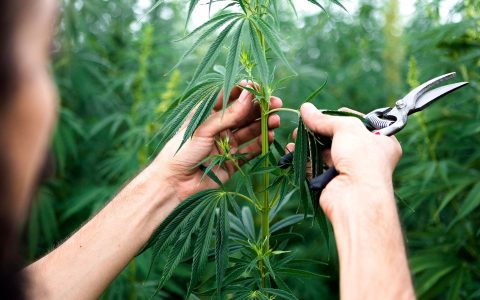It’s probably fair to say that Alberta hasn’t enjoyed the most auspicious of economic times over recent years. In fact the province has only just dragged itself out of one of the worst recessions in recent history, a chapter that left tens of thousands of people out of a job.
Driven by the collapse in global oil prices, the bust that Alberta experienced was as sharp as the boom years that had preceded it. Indeed in 2015 alone the province lost 19,600 jobs, its worst downturn in more than 30 years.
But as the green shoots of recovery begin to flourish, what role can the newly legalized cannabis industry play in injecting new life into the Albertan economy?
With a market that’s estimated at around $500 million—a drop in the ocean of the province’s $300 billion GDP—it’s fair to say that the cannabis industry has a long way to go before it can compete with the energy sector that has dominated the Albertan economy in recent decades. But despite its size, many people believe that cannabis can play a key role in creating more jobs in the province.
Charlotte Collett, Sundial Growers
“The last four or five years have been very challenging and all Albertans have been hit hard by the prolonged downturn in the energy sector,” says Charlotte Collett, Chief People Officer at Sundial Growers an Alberta-based licensed producer.
“Alberta’s successful past is a story of entrepreneurship, innovation, and being open to new industries that drive local economies,” she adds. “Our industry has the opportunity to make a significant impact to the economy and develop a reputation as the hub of the industry—not dissimilar to the reputation Alberta has made in the energy industry.”
Though energy and cannabis might seem worlds apart, according to Mack Andrews, Vice Chair of the Alberta Cannabis Collective (ABCC), the similarities between the energy sector and the legalized cannabis landscape could be the catalyst for creating new jobs in the province.
“It is tough to say if it will single-handedly get us out of the recession because there is a huge difference in scale between the energy industry and cannabis,” he says. “That said, we are seeing a migration from oil and gas production towards cannabis production due to the significant similarities in methodology and execution… Certainly, the workforce and skill sets in Alberta are easily translatable into this blooming industry.”
A Growing Workforce
Clearly, Alberta is well positioned to take advantage of the cannabis industry, and as dollars start to migrate from the black market to legitimate enterprises the economy will surely benefit. But will the legalization of cannabis create new jobs in the province?
“It already has,” says Andrews. “We are starting to see a proliferation of cannabis jobs in Alberta… Communities such as Olds and Medicine Hat have recognized the large economic benefits associated with supporting the cannabis industry and have actively attracted larger producers such as Aurora and Sundial, respectively.”
In fact, Sundial recently opened its flagship facility in Olds, Alberta. When it is fully completed in 2019 the 500,000 sq. ft. facility will consist of 140 state-of-the-art, individually controlled cultivation rooms capable of producing over 100 million grams of cannabis annually. It will also create hundreds of jobs for the local community.
“Sundial is expecting to employ 500 people in Olds once their facility is completed, making them the largest employer in town,” said Olds Mayor, Michael Muzychka when the facility was opened. “The Town of Olds opened its doors to the cannabis industry and we are pleased that Sundial has chosen to make such a large investment in our community.”
Though the biggest impact has been on rural communities like Olds that have embraced the economic benefits of cannabis production, Mack Andrews also estimates that more than 2,500 jobs have already been created thanks to the growth in storefront retail, much of which is located in urban centres including Calgary and Edmonton.
That will undoubtedly be good news to the 7.3% of Albertans who currently find themselves unemployed. There is already evidence to suggest that people are seeking out cannabis related careers with online recruitment giant Indeed revealing recently that industry-related searches among job seekers were four times higher this year than they were in 2017, with Alberta ranking second behind only BC in terms of interest from potential employees.
Cannabis as a Catalyst for Economic Growth
There’s clearly an appetite among Albertans to explore the possibilities that are being served up in the post legalized landscape, and the good news for job seekers is that the future for cannabis, and thus cannabis related roles, looks bright in the province.
The AGLC, the Government of Alberta’s Crown commercial enterprise that oversees the gaming, liquor and cannabis industries, expects to open 250 stores in the first year of legalization alone. Not only will these stores need staff, but the production and ancillary services that are required to support the industry are also expected to flourish.
Private businesses have also begun to explore the economic benefits of bud. Just last month coffee chain Second Cup confirmed that it planned to convert two of its stores into cannabis dispensaries in the near future.
All of which points to a bright future for pot in the province. “Alberta is strongly positioned on both the production and retail side of the value chain,” adds Andrews. “From the production perspective, we have a very strong agricultural landscape with great availability of land and lower power rates—both of which are the two key inputs into growing cannabis. From a retail perspective, the Alberta cannabis framework is the most progressive and mature across Canada.”
It’s a sentiment that Collett wholeheartedly agrees with. “We applaud the Alberta government for supporting a private retail model,” she says. “We believe this help will contribute to the growth of the Alberta economy.”














